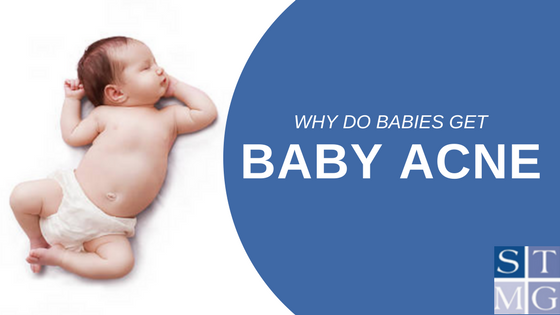Why Do Babies Get Baby Acne?
Most of us can remember at least one semi-traumatizing experience from our teen years involving acne, right? With those days likely behind you now, acne may have fallen off your radar – aside from the occasional pimple or blemish.
And then one day you pick up your newborn to find… baby acne? Yes, baby acne is surprisingly common! Our Nashville pediatricians at St. Thomas Medical Group have put together this brief Q&A to address your questions and help you care for your infant.
Is baby acne normal?
First off, yes! Don’t worry. Baby acne is quite common among infants. (And it won’t cause them anywhere near the level of social embarrassment they’ll have the opportunity to experience fourteen years later!)
Newborns still have many maternal hormones circulating in their system in the first few weeks following birth. These hormones can cause pimples to develop on the face (chin, cheeks, forehead and eyelids, for example). It’s not uncommon to see baby acne on the chest, neck or back, too.
Before you blame yourself, Mom, it’s worth mentioning that baby acne isn’t only caused by maternal hormones. Because the pores in your newborn’s skin aren’t completely developed, your baby may be susceptible to developing acne caused by some other external irritant.
When does baby acne start?
Forty percent of all newborns develop baby acne at two to three weeks of age. (In some cases, baby acne may be present at birth.) This condition can last until six months of age. It’s important to note that baby acne does not cause scarring (like acne later in life), nor is it an indicator of future teen/adult acne issues.
What helps baby acne?
Baby acne typically resolves itself without any specific home-care or professional medical care. However, you can gently cleanse and pat-dry the area two or three times a day. Do not use acne medicine, soap, lotion or any other chemicals. Also, just as is the case with adult acne, no squeezing or picking!
Can I be sure it’s baby acne? Or is it something else?
Of course, not all raised or pimply-looking skin conditions are baby acne. Infants may develop similar signs of irritation as a result of milia, heat rash, diaper rash, infant eczema or cradle cap. If you’re concerned that skin irritation could be something more than baby acne, talk to your Nashville pediatrician at St. Thomas Medical Group.
What’s the difference between milia and baby acne?
Milia (small white bumps that sometimes develop on an infant’s face) are similar to baby acne, but completely unrelated. These bumps are typically present at birth, while baby acne typically develops several weeks later. These white bumps occur when small flakes of skin become trapped in pockets just beneath the surface of the skin. Nearly half of all babies have milia on the upper cheeks, chin or nose. These little bumps are neither painful nor contagious and will resolve on their own in just a couple of weeks. No special washing, scrubbing or treatment is necessary.
Baby acne (and milia) is usually more upsetting to new parents than to the baby. Both of these conditions just require a little time and patience! In a few weeks (or months at the latest) your baby will develop a smooth, clear complexion!
See a Pediatrician In Nashville, TN
Are you concerned about baby acne in your infant? To schedule an appointment with a board-certified pediatrician in Nashville, contact St. Thomas Children and Adults Medical Group by calling +1 (615) 297-2700. Our Nashville pediatricians have offered quality care at the intersection of Green Hills, Sylvan Park and Belle Meade for over 40 years.




Leave a Reply
Want to join the discussion?Feel free to contribute!